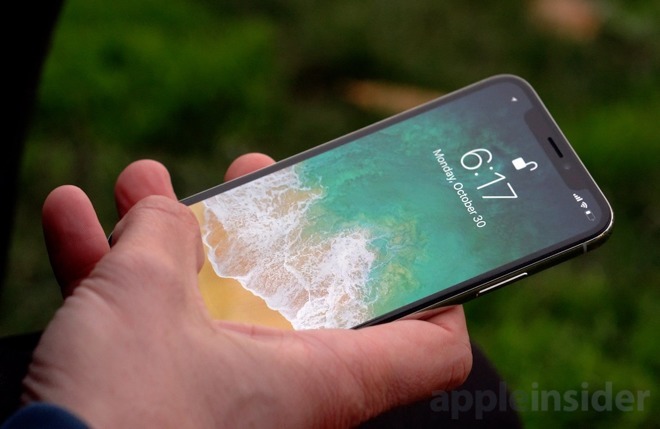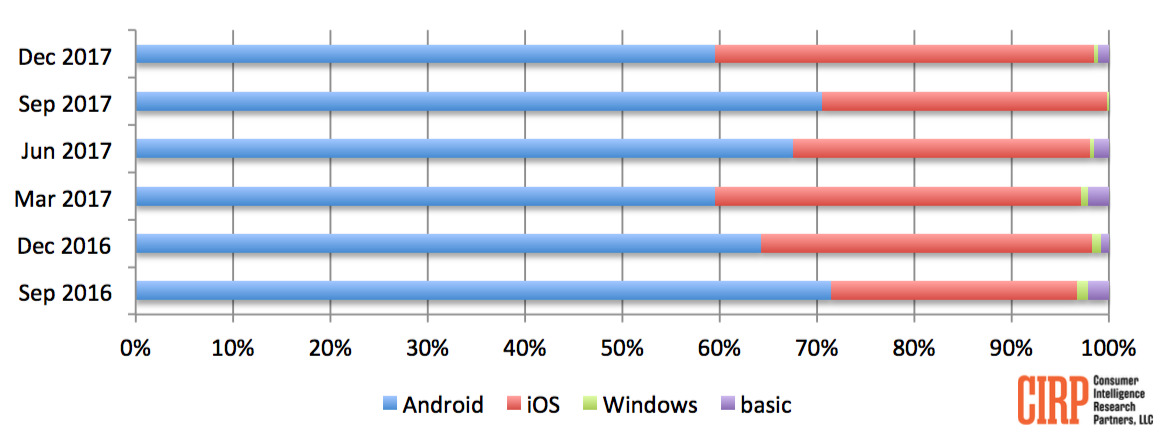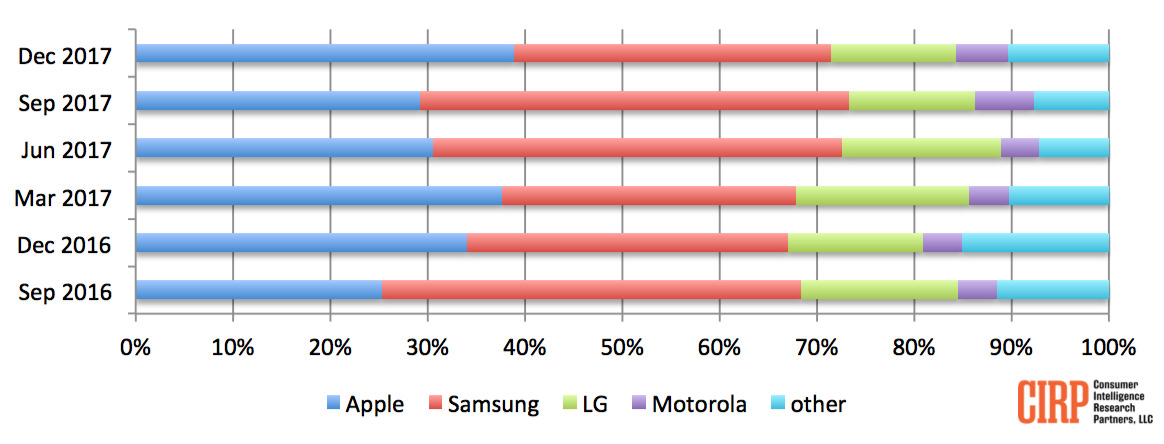Apple enjoyed a bumper quarter in the United States following the launch of the iPhone 8, 8 Plus, and iPhone X, according to a consumer research report into device activations, with activations of iPhones in the last quarter of 2017 up compared to both the previous quarter and the same quarter in 2016.
In the fourth quarter of 2017 ending December 31, Apple had the highest share of smartphone activations on carriers in the U.S., the report from Consumer Intelligence Research Partners claims achieving a 39 percent share of the market. This is said to be an improvement compared to the September 2017 quarter, where iPhones accounted for only 29 percent of activations across the period.
The higher activations share for the end of 2017 is also higher than for the end of 2016, where Apple acquired 34 percent of activations in the quarter.
By comparison, Android devices accounted for 60 percent of U.S. smartphone activations for the December quarter of 2017, down from the 64 percent recorded for the same quarter in 2016, and a larger decrease from the 71 percent share recorded in the September quarter of 2017.
The shift in market share for Apple is credited by CIRP partner and co-founder Josh Lowitz to the company's major launches in the fall. While Android still leads, the launch of the new iPhone 8, 8 Plus, and X models, without similar new Android phones, allowed Apple to increase its share of activations in the quarter, relative last quarter and to the year-ago quarter.
Broken down into brands, Apple also came out on top in the quarter, with its 39 percent share topping Samsung's 32 percent and LG's 13 percent shares. Other brands, including Motorola and HTC, made up the remaining activations in the period, totaling approximately 15 percent.
In the first full quarter after the launch of its three new models, Apple grew its share relative to Android brands, adds Lowitz. Comparing the change in share from the September quarter to the December quarter in 2016 and 2017, Lowitz notes Apple clearly improved its market position, gaining ten percentage points between quarters in both years.
As (Apple) had a better September quarter in 2017 than in 2016, this resulted in an overall stronger December quarter, Lowitz notes.
The report's findings concerning Apple's dominance echoes similar analysis from Yahoo's Flurry Mobile over global activations, released at the end of last month. In that report, Apple is claimed to have the highest number of device activations of any smartphone producer for the week leading up to Christmas, achieving a 44 percent share compared to Samsung's 26 percent.
Notably, while the iPhone X, iPhone 8 Plus, and iPhone 8 accounted for 31.5 percent of these activations, the highest individual device activations were for the iPhone 7 and iPhone 6 with respective shares of 15.1 percent and 14.9 percent. It is likely that price played a major factor, with customers in emerging markets with lower incomes more sensitive to the cost of mobile devices.
 Malcolm Owen
Malcolm Owen



-m.jpg)






 Andrew O'Hara
Andrew O'Hara
 Wesley Hilliard
Wesley Hilliard


 Marko Zivkovic
Marko Zivkovic

 Chip Loder
Chip Loder
 Christine McKee
Christine McKee



-m.jpg)




6 Comments
Looks like a blowout Q1, then? B)
We'll see the real numbers soon. I never really pay attention to guesses based on x, y, z.
The record App Store sales over Christmas should be an indicator of how well the last quarter was.
Is that even possible for Apple to boost activations? I'd come to the conclusion that Apple was really struggling to sell iPhones during the holiday quarter. Most of the articles I've read about iPhone sales this quarter usually contain the terms "lackluster" "poor" "below expectations" and "dismal." This is about the only article I've seen that says Apple is actually selling a fair amount of iPhones to consumers. It's really difficult to understand why there is always such a wide disparity when it comes to iPhone sales. I never know what they're being based upon. Component supply rumors, someone counting heads on Apple retail store queues, or just poorly educated guesses? I've always waited for the quarterly financial report because only Apple has a handle on correct iPhone sales numbers. Why are these other people always speculating without solid data? Guessing either positive or negative sales numbers isn't really all that useful for potential Apple investors. As an Apple shareholder I can only hope Apple sold a decent amount of iPhones if not a huge amount. I just couldn't understand why only Apple was having problems selling products while all the other tech companies were having a blowout quarter.
And Pixel2 not even a blip.